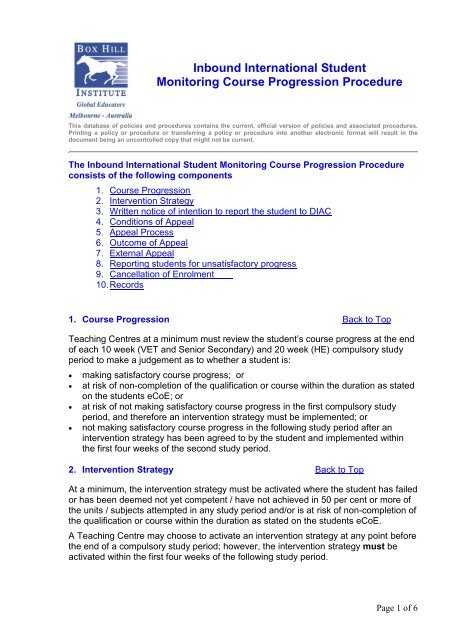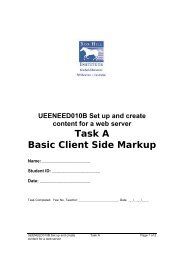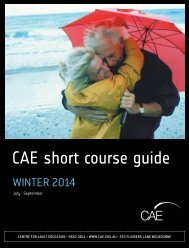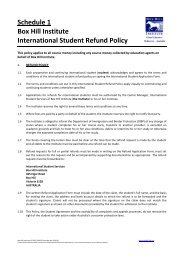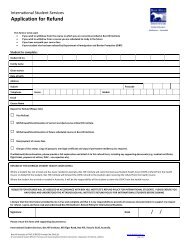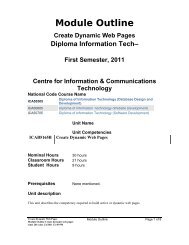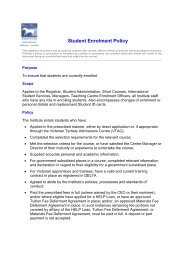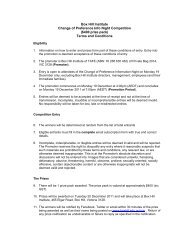Procedure - Box Hill Institute of TAFE
Procedure - Box Hill Institute of TAFE
Procedure - Box Hill Institute of TAFE
You also want an ePaper? Increase the reach of your titles
YUMPU automatically turns print PDFs into web optimized ePapers that Google loves.
Inbound International Student<br />
Monitoring Course Progression <strong>Procedure</strong><br />
This database <strong>of</strong> policies and procedures contains the current, <strong>of</strong>ficial version <strong>of</strong> policies and associated procedures.<br />
Printing a policy or procedure or transferring a policy or procedure into another electronic format will result in the<br />
document being an uncontrolled copy that might not be current.<br />
The Inbound International Student Monitoring Course Progression <strong>Procedure</strong><br />
consists <strong>of</strong> the following components<br />
1. Course Progression<br />
2. Intervention Strategy<br />
3. Written notice <strong>of</strong> intention to report the student to DIAC<br />
4. Conditions <strong>of</strong> Appeal<br />
5. Appeal Process<br />
6. Outcome <strong>of</strong> Appeal<br />
7. External Appeal<br />
8. Reporting students for unsatisfactory progress<br />
9. Cancellation <strong>of</strong> Enrolment<br />
10. Records<br />
1. Course Progression Back to Top<br />
Teaching Centres at a minimum must review the student’s course progress at the end<br />
<strong>of</strong> each 10 week (VET and Senior Secondary) and 20 week (HE) compulsory study<br />
period to make a judgement as to whether a student is:<br />
<br />
<br />
<br />
<br />
making satisfactory course progress; or<br />
at risk <strong>of</strong> non-completion <strong>of</strong> the qualification or course within the duration as stated<br />
on the students eCoE; or<br />
at risk <strong>of</strong> not making satisfactory course progress in the first compulsory study<br />
period, and therefore an intervention strategy must be implemented; or<br />
not making satisfactory course progress in the following study period after an<br />
intervention strategy has been agreed to by the student and implemented within<br />
the first four weeks <strong>of</strong> the second study period.<br />
2. Intervention Strategy Back to Top<br />
At a minimum, the intervention strategy must be activated where the student has failed<br />
or has been deemed not yet competent / have not achieved in 50 per cent or more <strong>of</strong><br />
the units / subjects attempted in any study period and/or is at risk <strong>of</strong> non-completion <strong>of</strong><br />
the qualification or course within the duration as stated on the students eCoE.<br />
A Teaching Centre may choose to activate an intervention strategy at any point before<br />
the end <strong>of</strong> a compulsory study period; however, the intervention strategy must be<br />
activated within the first four weeks <strong>of</strong> the following study period.<br />
Page 1 <strong>of</strong> 6
Intervention strategy is to be activated by:<br />
<br />
<br />
informing the students in writing that they have been identified as failing or at<br />
risk <strong>of</strong> failing to meet course progress requirements; and,<br />
personal contact with the student by a suitably authorised teaching centre staff<br />
member.<br />
The Intervention strategy must specify what support will be provided to the student at<br />
risk <strong>of</strong> not meeting satisfactory course progress requirements.<br />
Strategies for assisting students at risk must include:<br />
<br />
<br />
<br />
where appropriate, advising students on the suitability <strong>of</strong> the course in which<br />
they are enrolled;<br />
assisting students by advising <strong>of</strong> opportunities for the students to be<br />
reassessed for tasks in units or subjects they had previously failed, or<br />
demonstrate the necessary competency in areas in which they had not been<br />
previously able to demonstrate competency; and<br />
advising students that unsatisfactory course progress in two consecutive study<br />
periods <strong>of</strong> a course could lead to the student being reported to DIAC and<br />
cancellation <strong>of</strong> his or her visa, depending upon the outcome <strong>of</strong> any appeals<br />
process.<br />
Additional Strategies for assisting students at risk could include, but are not limited<br />
to,<br />
<br />
<br />
<br />
<br />
<br />
<br />
<br />
transition support;<br />
English language support;<br />
study skills support;<br />
welfare support;<br />
re-enrolment in the unit failed/NYC or missed;<br />
being placed in a suitable alternative subject within a course or a suitable<br />
alternative course; or<br />
a combination <strong>of</strong> the above and a reduction in course load.<br />
A copy <strong>of</strong> the intervention plan signed by both the student and the teaching centre<br />
representative is to be sent to the Manager <strong>of</strong> International Student Services.<br />
If the Intervention Strategy requires a variation to the enrolment and study load a<br />
Request for alteration <strong>of</strong> students eCoE is to be sent to the Manager International<br />
Student Services.<br />
3. Written notice <strong>of</strong> intention to report the student to DIAC Back to Top<br />
If a student is identified as not making satisfactory course progress in a second<br />
consecutive compulsory study period in a course, the Teaching Centre Manager or<br />
delegate must notify in writing the Manager <strong>of</strong> International Student Services prior to<br />
the end <strong>of</strong> that study period.<br />
The Manager <strong>of</strong> International Student Services will notify the student in writing <strong>of</strong> the<br />
<strong>Institute</strong>’s intention to report the student to DIAC for unsatisfactory progress. The<br />
Page 2 <strong>of</strong> 6
written notice must inform the student that he or she is able to access <strong>Box</strong> <strong>Hill</strong><br />
<strong>Institute</strong>s Appeal process and that the student has 20 working days in which to do so.<br />
4. Conditions <strong>of</strong> Appeal Back to Top<br />
A student may appeal on the following grounds:<br />
<br />
<br />
<br />
Teaching Centre failure to record or calculate a student’s marks accurately;<br />
Compassionate or compelling circumstance; or<br />
The Teaching Centre has not implemented its intervention strategy and other<br />
relevant Academic Polices according to its documented polices and procedures<br />
that have been made available to the student.<br />
5. Appeal Process Back to Top<br />
Within 10 working days <strong>of</strong> receipt <strong>of</strong> the appeal, an independent panel comprising a<br />
member <strong>of</strong> the Board <strong>of</strong> Studies relevant to the course in which the student is enrolled,<br />
the Centre Manager Student Support Services and a Teaching Centre Manager from<br />
a teaching centre not involved with the appeal will be formed to consider the appeal.<br />
A representative <strong>of</strong> International Student Services, and a representative <strong>of</strong> the<br />
Student’s Teaching Centre, will be available to attend and to provide input but will not<br />
take part in the decision on the appeal.<br />
If the evidence is found to be incomplete, the Student Support representative will<br />
contact the student and request further documentation.<br />
The student will be invited to formally present their case to the Panel, and may be<br />
assisted by a support person.<br />
The Panel will meet as soon as is practicable to review the appeal and evidence<br />
submitted in support <strong>of</strong> the appeal.<br />
The Panel considers the appeal, makes their decision and informs the student by<br />
letter <strong>of</strong> the decision, within fourteen (14) working days <strong>of</strong> the appeal hearing.<br />
The student will remain enrolled and will have the right to continue to attend classes<br />
whilst the appeal is being heard unless there is a compelling reason such as a risk to<br />
health and safety to a member <strong>of</strong> the <strong>Institute</strong> community. In this case other<br />
arrangements can be made by negotiation <strong>of</strong> the parties to ensure that the student is<br />
not disadvantaged.<br />
Page 3 <strong>of</strong> 6
6. Outcome <strong>of</strong> Appeal Back to Top<br />
Where the student’s appeal is successful, <strong>Box</strong> <strong>Hill</strong> <strong>Institute</strong> will not report the student<br />
to DIAC. The outcomes will vary according to the findings <strong>of</strong> the appeals process.<br />
If the appeal finds that:<br />
<br />
<br />
there was an error in calculation, and the student actually made satisfactory<br />
course progress, in this case there is no requirement for intervention<br />
the student has not made satisfactory progress, but there are compassionate or<br />
compelling reasons for lack <strong>of</strong> progress, ongoing support must be provided to<br />
the student through <strong>Box</strong> <strong>Hill</strong> <strong>Institute</strong>’s Intervention strategy<br />
Where the student’s appeal is unsuccessful, students will be advised <strong>of</strong> their right to:<br />
lodge an appeal or grievance with appropriate external organisations. These<br />
include the Human Rights and Equal Opportunity Commission, or the State<br />
Equal Opportunity Commission, the State and Commonwealth Ombudsman’s<br />
Office.<br />
ask the <strong>Institute</strong> to request an external mediator be provided by the Australian<br />
Council for Private Education and Training.<br />
contact the Commonwealth Department <strong>of</strong> Education, Employment and<br />
Workplace Relations in relation to grievances under the ESOS Act.<br />
Students have a right to access an external appeals process at minimal or no cost.<br />
The <strong>Institute</strong> will not impose any fee related to external appeals.<br />
7. External Appeal<br />
Students who choose to access an external appeals process should notify the<br />
International Student Services Office <strong>of</strong> this within 10 working days <strong>of</strong> receipt <strong>of</strong> the<br />
decision.<br />
The <strong>Institute</strong> will hold <strong>of</strong>f from any further action until it is advised <strong>of</strong> the outcome <strong>of</strong><br />
the external appeal by the external appeal body.<br />
The student will remain enrolled and will have the right to continue to attend classes<br />
whilst the appeal is being heard unless there is a compelling reason such as a risk to<br />
health and safety to a member <strong>of</strong> the <strong>Institute</strong> community. In this case other<br />
arrangements can be made by negotiation <strong>of</strong> the parties to ensure that the student is<br />
not disadvantaged.<br />
Page 4 <strong>of</strong> 6
8. Reporting students for unsatisfactory progress Back to Top<br />
Where the student has:<br />
chosen not to access the complaints and appeals processes within the 20<br />
working day period,<br />
<br />
<br />
withdraws from the process, or<br />
the process is completed and results in a decision supporting <strong>Box</strong> <strong>Hill</strong> <strong>Institute</strong>,<br />
The Manager International Student Services will notify the Secretary <strong>of</strong> DEEWR<br />
through PRISMS <strong>of</strong> the student not achieving satisfactory course progress within 5<br />
working days <strong>of</strong> the relevant event.<br />
9. Cancellation <strong>of</strong> Enrolment Back to Top<br />
Where the decision is taken to cancel the student’s enrolment the Manager <strong>of</strong><br />
International Student Services will arrange for the completion <strong>of</strong> the Registrar’s<br />
Course Exit Form and send the form to Student Administration.<br />
The form will be processed by Student Administration, which will <strong>of</strong>ficially cancel the<br />
student’s enrolment at <strong>Box</strong> <strong>Hill</strong> <strong>Institute</strong>.<br />
10. Records Back to Top<br />
Where a Teaching Centre has implemented an intervention strategy, the relevant<br />
documents including the following must be kept in each student’s files within the<br />
Teaching Centre.<br />
<br />
<br />
<br />
<br />
<br />
Letter generated by the Teaching Centre informing the students in writing that<br />
they have been identified as failing or at risk <strong>of</strong> failing to meet course progress<br />
requirements;<br />
Any notes relating to discussions with the student by a suitably authorised<br />
teaching centre staff member;<br />
Intervention Strategy document signed by both the teaching centre<br />
representative and the student;<br />
Request to Manager International Student Services for alteration to students<br />
eCoE if the Intervention Strategy requires a variation to the enrolment and<br />
study load that would lead to a need to extend the eCoE; and,<br />
Notification from teaching centre indicating that the student is not making<br />
satisfactory course progress in a second consecutive compulsory study period<br />
in a course.<br />
The International Student Services Office will keep copies <strong>of</strong> all the following<br />
documents, in the student’s file:<br />
<br />
<br />
Letter generated by the Teaching Centre informing the students in writing that<br />
they have been identified as failing or at risk <strong>of</strong> failing to meet course progress<br />
requirements;<br />
Any notes relating to discussions with the student by a suitably authorised<br />
teaching centre staff member;<br />
Page 5 <strong>of</strong> 6
Intervention Strategy document signed by both the teaching centre<br />
representative and the student;<br />
Notification from teaching centre indicating that the student is not making<br />
satisfactory course progress in a second consecutive compulsory study period<br />
in a course;<br />
Notification letter <strong>of</strong> the intention to report the student for unsatisfactory course<br />
progression, the appeals process and the mechanism to access the Student<br />
Grievance Policy and <strong>Procedure</strong>;<br />
Written request to the Executive Director, Learning and Academic Affairs to<br />
appeal the intention to notify DIAC via PRISMs for unsatisfactory course<br />
progression;<br />
Document indicating the outcome <strong>of</strong> the appeal and any actions required;<br />
Letter and copy <strong>of</strong> the PRISMS generated Section 20 notice;<br />
Registrars Course Withdrawal Form.<br />
Forms<br />
All forms are in the Inbound International Student Monitoring Course Progression<br />
Kit For Teachers.<br />
<br />
<br />
<br />
<br />
<br />
Course Progress Intervention Strategy Letter Template One<br />
Course Progress Intervention Strategy Letter Template Two<br />
Course Progress Intervention Strategy Pr<strong>of</strong>orma<br />
Notification to Manager ISS Memo<br />
Monitoring Course Progression Intervention Strategy Guidelines<br />
.<br />
Page 6 <strong>of</strong> 6


